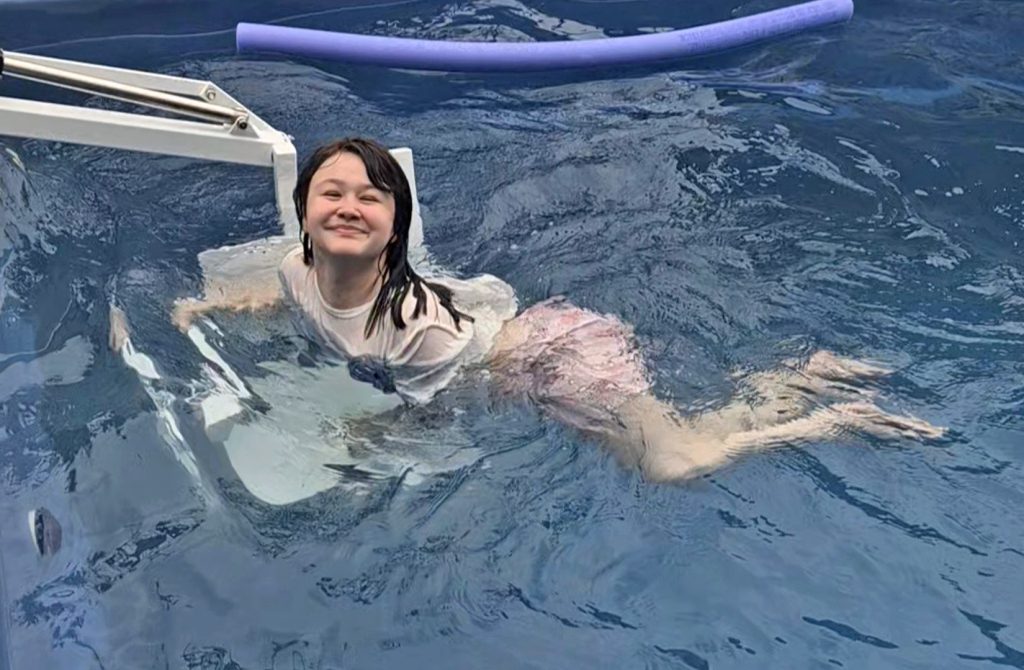For Ashlee and her daughter Chanaye, a simple day out—whether to the beach, the local pool, or a holiday resort—often begins not with spontaneity, but with spreadsheets, phone calls, and careful planning. Accessibility, or more often the lack of it, shapes nearly every aspect of their daily life. While most families might throw on swimwear and head to the nearest swimming pool, for Ashlee, even that joy has come with barriers.
“Going out requires so much research,” Ashlee shares. “We have to investigate whether the location has ramps, proper accessible bathrooms, or a hi-lo change table. It’s not just about whether there’s a toilet with a handle. And even when there are accessible features on paper, they’re often narrow, outdated, or just not fit for purpose.”
For Chanaye, who sustained a spinal cord injury at age six, the ability to join her siblings in play and relaxation isn’t just about fun—it’s about inclusion. It’s about dignity. “Not being able to safely access pools has really impacted her mental health,” says Ashlee. “She just wants to spend time with her siblings, out of her wheelchair, and be in the water like any other kid.”
Too often, the absence of something as simple as a pool hoist means none of the family swims. “We won’t use the pool if she can’t,” Ashlee explains. “It doesn’t feel right leaving her out.”
But in the midst of these limitations, there are moments that shine. The beach is one of Chanaye’s favourite places. Thanks to beach wheelchairs and access matting, she’s had the chance to feel the sand beneath her wheels and the breeze on her face. “It was one of her highlights,” Ashlee says. “To be part of the experience, not just an observer.”
Water is a symbol of freedom and when Chanaye is in it, she is no longer defined by her chair, her injury, or the barriers society places in her way. “It helps her feel the same as her siblings,” Ashlee says, “and that is powerful for her confidence and wellbeing.”
These experiences have not only shaped Ashlee’s perspective as a parent, but also informed her professional journey. As a former team member at Accessible Accommodation—a leading platform dedicated to helping people with disability and mobility needs find verified, inclusive places to stay—Ashlee brought her lived experience to the forefront. Having faced the challenges of inaccessibility firsthand, she played a key role in advocating for features that truly make a difference—like pool hoists, step-free access, and properly equipped change facilities.
The shortage of accessible indoor hydrotherapy facilities isn’t just a challenge for Ashlee’s family—it’s a widespread issue impacting countless individuals throughout Australia. Many are forced to travel long distances, just to find a pool with a hoist or appropriate changing facilities. “A pool hoist at every public or holiday pool should be a given,” Ashlee says. “It shouldn’t be rare—it should be the rule.”
“At Accessible Accommodation, our list of stays with accessible pools keeps growing. Our members genuinely want to ensure families like Ashlee’s have a joyful and memorable holiday experience. Our followers love staying at places with accessible pools, creating lasting memories where everyone is able to have fun.” Kerry, Founder of Accessible Accommodation, shared.
Ashlee and Chanaye’s story is a reminder that access isn’t a luxury—it’s a right. And while the barriers may be physical, the impact is deeply emotional. Every ramp, hoist, change facility and thoughtful design choice creates a world where families like theirs can live, play, and thrive—together. Through their lived experience, and through Accessible Accommodation’s growing platform, they continue to shine a light on what’s possible when inclusion is no longer an afterthought, but a priority.

